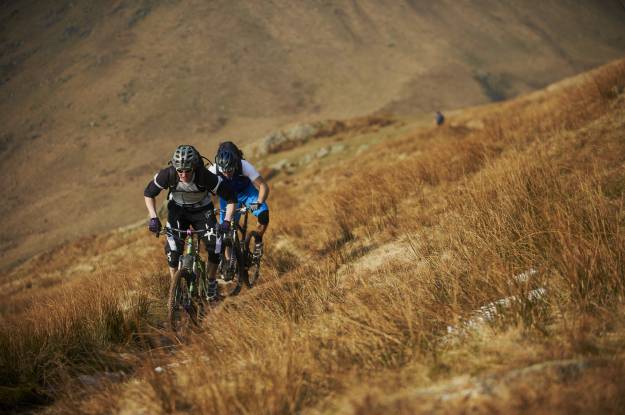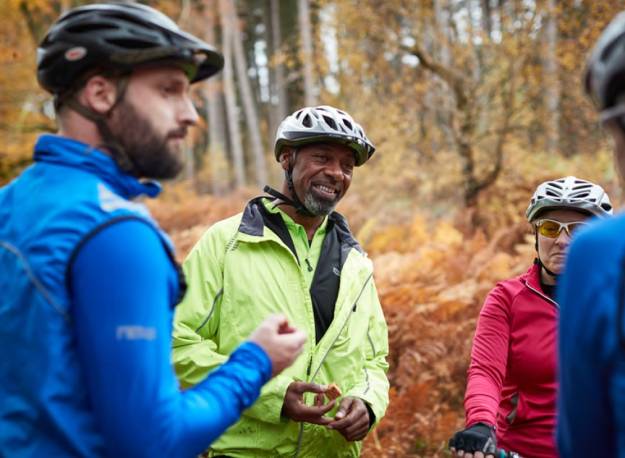Scottish Cycling, Welsh Cycling and British Cycling have all joined forces to create a UK-wide Mountain Bike Leadership Award.
We recently caught up with Jim Riach, corporate services manager at Scottish Cycling and founder member of the Scottish Mountain Bike Leader Awards, who shares his thoughts on the scheme and tells us more about what this means for the current Mountain Bike Leader Awards in Scotland.
Why have you decided to develop a UK-wide mountain bike leadership scheme?
Scottish Cycling and its Mountain Bike Leader Awards (MBLA) scheme had led developments in this area for over 15 years, with mountain biking being a popular activity suited to the Scottish environment and landscape.
Scottish Cycling is an integral part of British Cycling (as is Welsh Cycling) and when British Cycling announced that it had secured funding and developed its own Mountain Bike Leader Award, it made sense to have dialogue with them.
The result of this dialogue was an agreement to combine forces and resources to create a unified award across all of the governing body territories of British Cycling, Scottish Cycling and Welsh Cycling. There was significant expertise and a recognised product from Scottish Cycling’s MBLA, finance, staffing and expertise within British Cycling and Welsh Cycling, and within all three bodies a much greater reach to make sure the award was accessible to a wider audience.
What do you think are the benefits of a UK-wide scheme?
The obvious ones are a much larger resource in terms of finance, staff, expertise and a wider reach. Though Scottish Cycling’s MBLA had strong recognition and support within the industry sector, an award developed in Scotland may not have seemed relevant to some in England and Wales; it is anticipated that an association with the home country governing bodies will improve this recognition.
It also brings links to other complementary programmes, such as coach education. Sharing the experience of the existing MBLA Tutor workforce across the UK will enable effective deployment of the new awards to the most suitable parts of the UK.
How is the current MBLA being taken forward as part of this?
Many of the existing MBLA Tutors will be those delivering the new scheme, so bringing forward that collective expertise gained over many years of hands-on delivery and experience. In the region of 7,000 candidates have graduated as Trail Cycle Leaders (TCL), which is a significant workforce.
The existing Trail Cycle Leader (TCL) and Mountain Bike Leader (MBL) qualifications will continue to be recognised, licenced and insured as long as those individuals holding those qualifications maintain their British Cycling membership. TCL’s and MBL ’s will receive the same ongoing support and services from the three governing bodies as any leader trained in the future.
While existing qualifications will continue to be recognised, it is anticipated that a range of opportunities will be developed to allow existing leaders to upgrade to higher level qualifications – for example, a TCL progressing onto the new Level 3 award.
Additionally, it is expected that a range of Continuing Professional Development (CPD) opportunities will become available to allow existing leaders to remain current and up-to-date with any new developments or innovation.
How do you see Mountain Bike Leadership progressing over the next decade?
The current qualification landscape and the range of cycling bodies can seem a bit confusing and cluttered, so I anticipate that this will become clearer and the roles of leaders and coaches will become better understood.
I would expect to see a continued growth in the number of leaders qualified and greater access to qualified leaders at a range of outlets, with a significant growth in the introductory level as more schools and youth groups offer the first taste of the activity.
At the same time, I see more opportunities to experience the fantastic countryside and specialist trail centres around the UK under the guidance of the higher qualified leaders. This would help to provide both a safe and adventurous experience that so many find fun, exciting and for some a great choice for a life-long health enhancing activity.
Could you tell us more about the mountain biking scene in Scotland?
Scotland has a vibrant mountain bike scene that makes huge contributions to the Scottish economy, with recent reports suggesting that it is around £155 million per annum and growing. Trail Centres, such as Glentress, are the biggest visitor attractors in their area and the 7 Stanes in the south of Scotland attracts more visitors than Whistler Mountain in Canada.
With some 84,000 kilometres on the Scottish path record and probably the most progressive access legislation in the world, Scotland has some of the most diverse and accessible mountain biking within easy reach of everyone.
The existing trail cycle and mountain bike leaders in Scotland are estimated to deliver 580,000 participant sessions per year in Scotland, many of these at outdoor centres and many introducing newcomers and young people to the activity of mountain biking.
Does the Mountain Bike Leadership scheme positively benefit society?
Absolutely, we have already outlined some of the significant economic impacts that the activity can have, regular participants can realise significant health - both physical and mental - and the activity helps to meet the government objective of getting more people into the countryside on a regular basis.
Those introduced into cycling through mountain biking can gain the confidence to try and adopt other types of cycling, such as utility and recreational road cycling, with the many benefits and opportunities it presents. Trail Centres and other sensitive mountain bike developments are proven to be well suited to integration in most other countryside management practices conveying benefits to all parties.
Cycling, and in particular the exciting activity of mountain biking, is one of the most popular activities for young people in Scotland. It is on offer at most outdoor education and activity centres and is always available when it is too windy to sail, not enough snow to go skiing or to wet to trudge up a hill.










